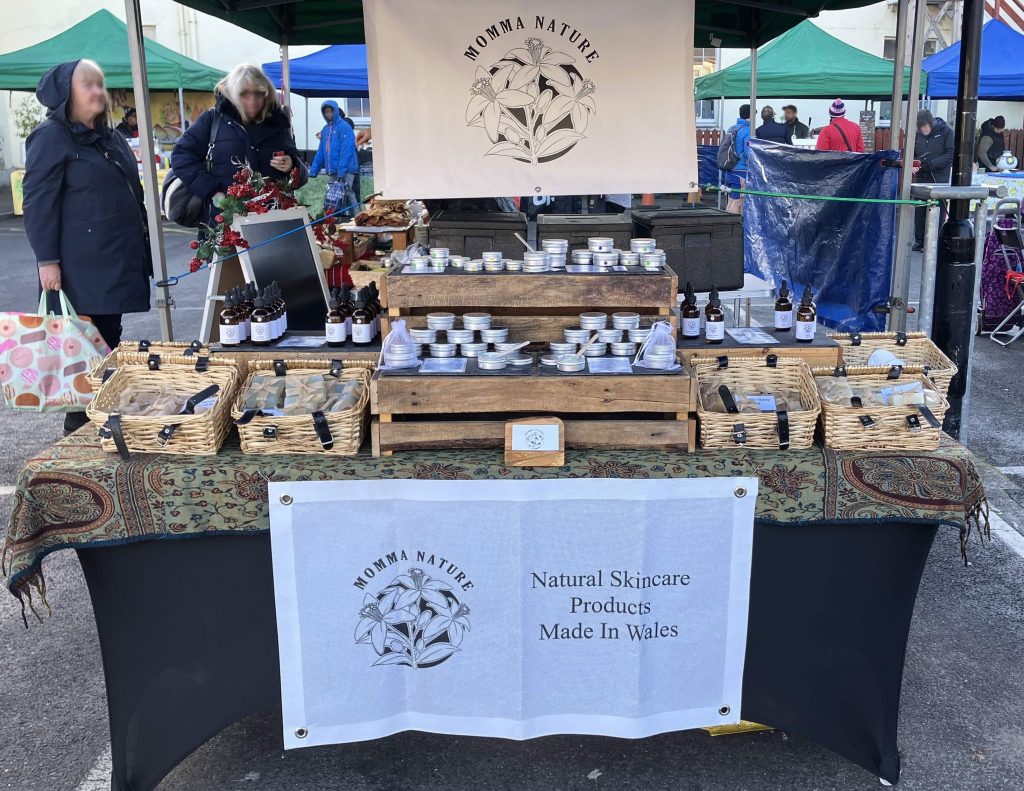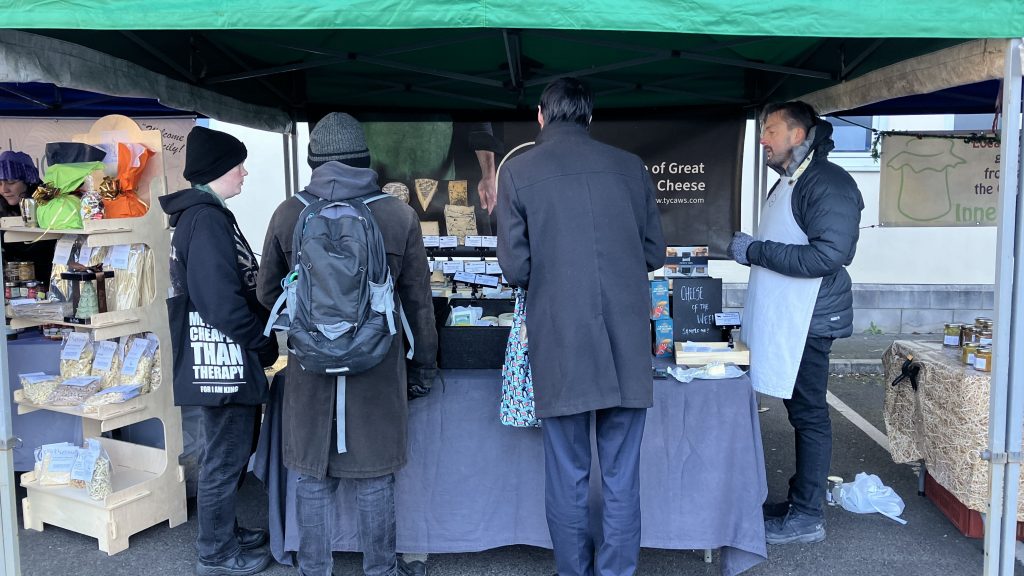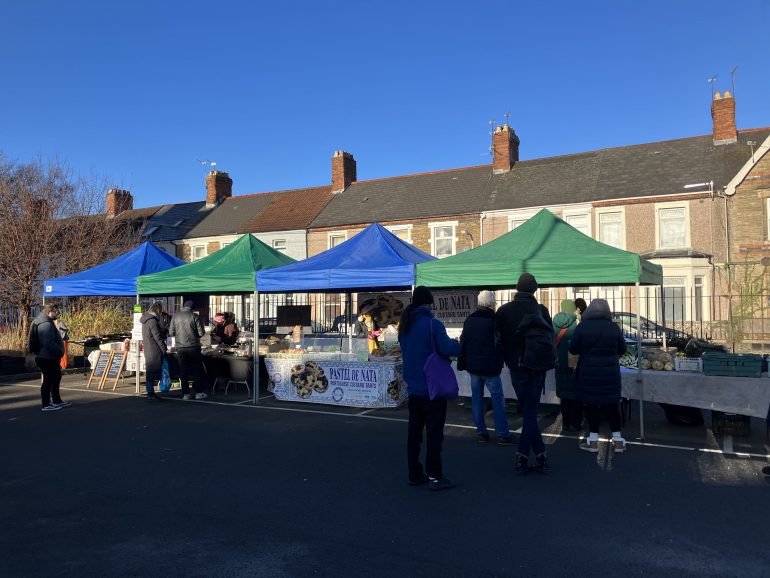Millions of employees will strike for better pay this winter but what about the people who earn their money at independent markets?
STALLHOLDERS at Cardiff Farmers Market in Roath saw last weekend as one of their few big remaining earning opportunities before Christmas.
They hoped for a busy Saturday, despite the freezing temperatures.
But the collection of hardy hawkers reported similar problems: higher business costs and fewer customers willing – or able – to spend money on their range of homemade and artisan produce.
Opened in 2008, Roath market has become a melting pot of cuisine and culture from around the world – including Brazilian chocolate and Bulgarian pastries – alongside local wares.

Amit Kochhar sells breakfast and barbecue food, which he prepares in his home kitchen and grills to order at the market
When he started trading as Bayside Grill a few months ago he was paying around £2.90 per kilogram of butter; now, a kilogram costs more than £4.
“It’s usually buzzing at this time,” Amit said, as the market’s few floating visitors sought shelter from an icy shower.
“I think that the markets are slowly dying.”
He isn’t alone in feeling the pinch.
Trecastle Eggs sell cheeses and butters made on their farm 10 miles west of Brecon. The family business supplies hotels and cafes near the farm but makes a good portion of their sales to market customers at sites like this one outside Mackintosh Sports Club.
Outdoor markets attract fewer customers since COVID, the family says. At the same time, the price of chicken feed and packaging for their produce have gone up.
Wendy from Cyncoed, known at the market as Momma Nature, has been selling homemade skincare products for five years.

She used to be a primary school teacher but now enjoys experimenting with natural ingredients and learning from friends, as well as the big brands.
“Christmas is usually really good,” Wendy says. “People are thinking about it more. Thinking about budgets. I’m the same. Normally I get loads of presents for everyone. I usually go to the markets and get a bit of cheese or something. This year…”
Wendy shakes her head. This will be the first time that she will “not bother” attending the markets in January. She expects that no one will have money to spend after Christmas.
“I can’t put the prices any lower.”
When asked about the future, Wendy said that she will always do markets but might have to invest more time in selling online. The mother-of-two believes that people “need to smell” her products because it’s the sights and smells that bring the market to life – experiences that are impossible to convey online.
Owen Davies tells customers that “cheese emerged as his calling” over 18 years ago. He runs Ty Caws full-time and employs two part-time staff.
In normal circumstances, the business could keep the prices of their products the same for five years. Mr Davies has upped prices three times in 2022 alone.

“The price of cheese has gone up. The price of our packaging has gone up. Electricity, for our fridges. Fuel, for our deliveries,” Mr Davies explained.
“So, yes. Our profits have been squeezed.”
Riverside Sourdough tell a similar story: “We operate on a very low profit margin, you see.”
A customer guides my attention to the selection of loaves. “This one here,” he recommends. “The rye is lovely.”
I come to a stall of traditional Bulgarian pastries across the aisle: Pekarna by Sneji.
“There are a lot of Bulgarian people here and the main thing we miss is the bakery.” Sneji explains. Her favourite food to make is banitsa – filo pastry pies with a number of savoury or sweet fillings. Customers seem to love them, too.
“There’s not a lot of Bulgarian cuisine here so I want to introduce it.”
Sneji started selling her own food in the summer of 2021. The outlook then was very different: the freedom of the first post-COVID summer, a different Prime Minister and little talk of the inflation that was about to put the relationship between sellers and shoppers under historic strain.

Making money at the market has never been harder, Sneji says. The high streets were not as busy as they had been in previous summers. They were so empty, says Sneji, that she felt everyone had abandoned the city centre for holidays abroad.
The markets have not become busier as the winter has drawn in. Week after week, Sneji finds herself spending an increasing amount for the same ingredients. Authentic Bulgarian products, in particular, cost more outside the European Union.
“I was worried about my bills at one point but I love it,” she says.
The enthusiastic customer from Riverside Sourdough joins us at Pekarna.
“If you’re taking notes, these are really nice.” He gives Sneji a smile. “Really good for diabetics, too.”
The customer does not buy anything on this occasion, but on this quiet market morning, Sneji has time to ponder his praise.
“To be honest with you, that’s what keeps me going.”
Cardiff Farmers Market convene in Rhiwbina every Friday, Roath every Saturday and Riverside every Sunday. More information can be found at http://www.riversidemarket.org.uk/.



